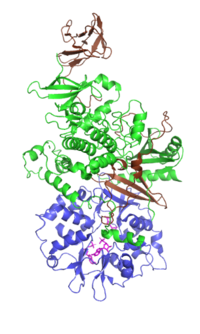
Photo from wikipedia
Pancreatic cancer is a highly lethal tumor that is characterized by a marked fibro-inflammatory microenvironment, presence of which can promote cancer progression. Few therapeutic options exist for pancreatic cancer, thus… Click to show full abstract
Pancreatic cancer is a highly lethal tumor that is characterized by a marked fibro-inflammatory microenvironment, presence of which can promote cancer progression. Few therapeutic options exist for pancreatic cancer, thus identification of pathways for targeting remains paramount. Specific p38 mitogen activated protein kinase (MAPK) inhibitors have been believed to improve prognosis of cancer, but divergent therapeutic effects were reported, as explained by the low potency and low selectivity associated side-effects. In this current study, VCP979, which is a novel p38 MAPK inhibitor with safety and efficacy in inhibiting the activity of serine threonine protein kinase, effectively suppressed orthotopic pancreatic cancer growth and metastasis. Bioluminescent imaging based on luciferase genes transformation was used to facilitate visualization, evaluation of tumor development, metastasis, and response to VCP979. In addition, type 2 diabetes mellitus promoted a more aggressive phenotype associated with up-regulated p38 MAPK activity, which was effectively inhibited by VCP979. Furthermore, the findings from this study suggest that VCP979 may exert its tumor-suppressing effects via regulation of p38 MAPK/Nuclear factor-κB (NF-κB) signal pathway, reduction of its downstream inflammation, as well as attenuations of epithelial-mesenchymal transition (EMT) in pancreatic cancer non-diabetic and diabetic conditions.
Journal Title: Journal of biomedical nanotechnology
Year Published: 2019
Link to full text (if available)
Share on Social Media: Sign Up to like & get
recommendations!